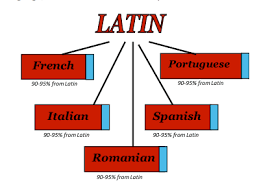(单词翻译:单击)
中英文本
Italy was unified far later, in the 19th century. “Italian” was thus created by the pen, not the sword. The 13th- and 14thcentury works of Dante, Petrarch and Boccaccio were the peninsula’s most revered literature. So when, in the 16th century, Pietro Bembo sat down to write a grammar for the prestige language of their texts, he used their (by now rather old) Tuscan dialect as his model. In this way “Italian” was born—though Bembo titled his book simply “Writings on the Vulgar Tongue”. It soon spread to elites in other regions.
意大利很晚才在19世纪统一。因此,“意大利语”是由笔而不是剑创造的。13、14世纪但丁、彼特拉克和薄伽丘的作品是半岛上最受尊敬的文学作品。因此,16世纪,当皮埃特罗·本博坐下来为他们的经典语言编写语法时,使用了他们的托斯卡纳方言(到目前为止相当古老)作为模型。就这样,“意大利语”诞生了——尽管本博把他的书简单地命名为“俗语的写作”。它很快就传播到了其他地区的精英阶层。

Even then, ordinary folk continued speaking their own dialects, which, across great enough distances—say from Milan to Naples—were and remain mutually incomprehensible. These are not bad copies of Italian but its siblings, descendants of Latin in their own right. Over half of Italians proudly speak one of them still (though nearly all speak Italian, too). A Sicilian who doesn’t speak Sicilian is hardly worthy of the name; Neapolitan plays a crucial role in the celebrated novels of Elena Ferrante.
即使在那个时候,普通百姓仍然在讲他们自己的方言,这些方言跨越了足够远的距离,比如从米兰到纳普勒斯,彼此之间仍然无法理解。这些并非意大利语失败的复制品,而是其兄弟姐妹,拉丁语的后裔。超过一半的意大利人仍然自豪地说其中一种语言(尽管几乎所有人也都说意大利语)。一个不会说西西里语的西西里人很难称得上是西西里人; 那不勒斯人在埃琳娜·费朗特的著名小说中起着至关重要的作用。
These days, amid migration and globalisation, Italian continues to develop. Naturally some worry that it is happening too fast; that young people are derelict in their grammar, or use too many foreign words. In reality, the same forces that made Latin from its predecessor (called Proto Indo-European), and turned Latin into Italian—the drift of time and exposure to different influences— are still operating. The only unchanging language is an unspoken one. Classical Latin may be dead—but as Italian, it lives on. Long live dismal Latin!
如今,在移民和全球化的背景下,意大利继续发展。自然有人担心这一切发生得太快;年轻人在语法上荒废了,还使用了太多的外来词。事实上,时间累积和受到的不同影响使拉丁语从前身原始印欧语变为拉丁语,而同样力量也把拉丁语变成意大利语,如今这种力量仍然在发挥作用。只要语言在使用就会一直发生改变。古典拉丁语可能已经绝迹,但作为意大利语,它仍然存在。没落的拉丁语万岁!
译文由可可原创,仅供学习交流使用,未经许可请勿转载。
词语解释
a snob 自命不凡的人
She was an intellectual snob.
她自诩才智高人一等。


